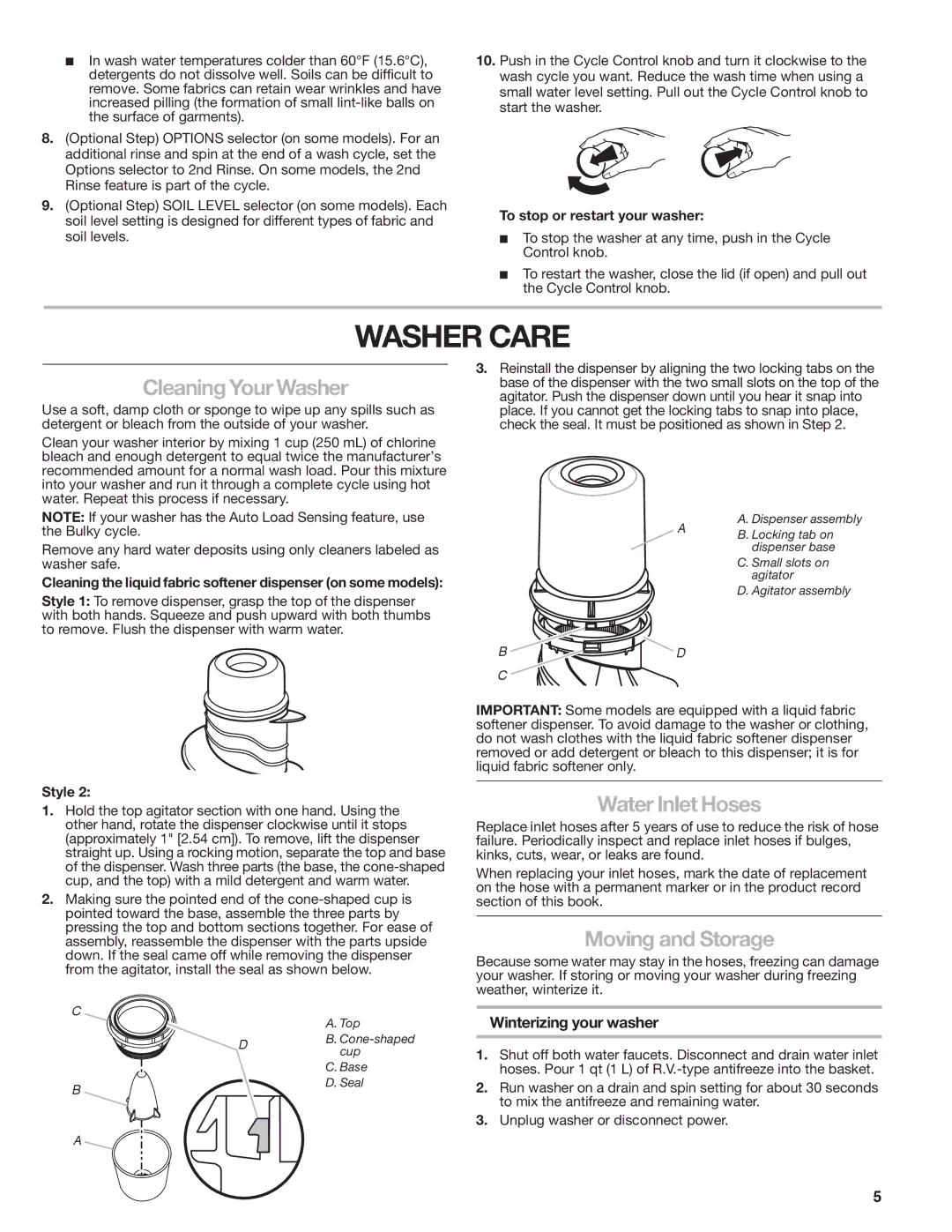
In wash water temperatures colder than 60°F (15.6°C), detergents do not dissolve well. Soils can be difficult to remove. Some fabrics can retain wear wrinkles and have increased pilling (the formation of small
8.(Optional Step) OPTIONS selector (on some models). For an additional rinse and spin at the end of a wash cycle, set the Options selector to 2nd Rinse. On some models, the 2nd Rinse feature is part of the cycle.
9.(Optional Step) SOIL LEVEL selector (on some models). Each soil level setting is designed for different types of fabric and soil levels.
10.Push in the Cycle Control knob and turn it clockwise to the wash cycle you want. Reduce the wash time when using a small water level setting. Pull out the Cycle Control knob to start the washer.
To stop or restart your washer:
To stop the washer at any time, push in the Cycle Control knob.
To restart the washer, close the lid (if open) and pull out the Cycle Control knob.
WASHER CARE
Cleaning Your Washer
Use a soft, damp cloth or sponge to wipe up any spills such as detergent or bleach from the outside of your washer.
Clean your washer interior by mixing 1 cup (250 mL) of chlorine bleach and enough detergent to equal twice the manufacturer’s recommended amount for a normal wash load. Pour this mixture into your washer and run it through a complete cycle using hot water. Repeat this process if necessary.
NOTE: If your washer has the Auto Load Sensing feature, use the Bulky cycle.
Remove any hard water deposits using only cleaners labeled as washer safe.
Cleaning the liquid fabric softener dispenser (on some models):
Style 1: To remove dispenser, grasp the top of the dispenser with both hands. Squeeze and push upward with both thumbs to remove. Flush the dispenser with warm water.
Style 2:
1.Hold the top agitator section with one hand. Using the other hand, rotate the dispenser clockwise until it stops (approximately 1" [2.54 cm]). To remove, lift the dispenser straight up. Using a rocking motion, separate the top and base of the dispenser. Wash three parts (the base, the
2.Making sure the pointed end of the
C
A. Top
DB.
| C. Base |
B | D. Seal |
|
A
3.Reinstall the dispenser by aligning the two locking tabs on the base of the dispenser with the two small slots on the top of the agitator. Push the dispenser down until you hear it snap into place. If you cannot get the locking tabs to snap into place, check the seal. It must be positioned as shown in Step 2.
A | A. Dispenser assembly |
B. Locking tab on | |
| dispenser base |
| C. Small slots on |
| agitator |
| D. Agitator assembly |
B ![]()
![]()
![]() D
D
C
IMPORTANT: Some models are equipped with a liquid fabric softener dispenser. To avoid damage to the washer or clothing, do not wash clothes with the liquid fabric softener dispenser removed or add detergent or bleach to this dispenser; it is for liquid fabric softener only.
Water Inlet Hoses
Replace inlet hoses after 5 years of use to reduce the risk of hose failure. Periodically inspect and replace inlet hoses if bulges, kinks, cuts, wear, or leaks are found.
When replacing your inlet hoses, mark the date of replacement on the hose with a permanent marker or in the product record section of this book.
Moving and Storage
Because some water may stay in the hoses, freezing can damage your washer. If storing or moving your washer during freezing weather, winterize it.
Winterizing your washer
1.Shut off both water faucets. Disconnect and drain water inlet hoses. Pour 1 qt (1 L) of
2.Run washer on a drain and spin setting for about 30 seconds to mix the antifreeze and remaining water.
3.Unplug washer or disconnect power.
5
